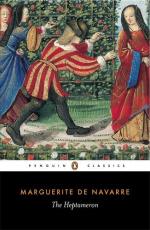The indifference shown by Francis for the political fortunes of his brother-in-law, despite the numerous and signal services the latter had rendered him, justly discontented Henry, who at last resolved to withdraw from the Court, where Montmorency, Brion, and several other personages, his declared enemies, were in favour. Margaret apparently had to follow her husband in his retirement, for Sainte-Marthe remarks: “When the King of Navarre, disgusted with the Court, and seeing none of the promises that his brother-in-law had made him realised, resolved to withdraw to Beam, Margaret, although the keen air of the mountains was hurtful to her health, and her doctors had threatened her with a premature death if she persevered in braving the rigours of the climate, preferred to put her life in peril rather than to fail in her duty by not accompanying her husband.” (2)
1 Bibliotheque Nationale, MS. No. 8546 (Bethune), fol. 107.
2 Oraison funebre, &c, p. 70.
Various biographers express the opinion that this retirement took place in 1529, shortly after the Peace of Cambray, and others give 1530 as the probable date. Margaret, we find, paid a flying visit to Beam with her husband in 1527; on January 7th, 1528, she was confined of her first child, Jane, at Fontainebleau, and the following year she is found with her little daughter at Longray, near Alencon. In 1530 she is confined at Blois of a second child, John, Prince of Viana, who died at Alencon on Christmas Day in the same year, when but five and a half months old. Then in 1531 her letters show her with her mother at Fontainebleau; and Louise of Savoy being stricken with the plague, then raging in France, Margaret closes her eyes at Gretz, a little village between Fontainebleau and Nemours, on September 22nd in that year.
It was after this event that the King and Queen of Navarre determined to proceed to Beam, but so far as Margaret herself is concerned, it is certain that retirement was never of long duration whilst her brother lived. She is constantly to be found at Alencon, Fontainebleau, and Paris, being frequently with the King, who did not like to remain separated from her for any length of time. He was wont to initiate her into his political intrigues in view of availing himself of her keen and subtle mind. Brantome, referring to this subject, remarks that her wisdom was such that the ambassadors who “spoke to her were greatly charmed by it, and made great report of it to those of their nation on their return; in this respect she relieved the King her brother, for they (the ambassadors) always sought her after delivering the chief business of their embassy, and often when there was important business the King handed it over to her, relying upon her for its definite resolution. She understood very well how to entertain and satisfy the ambassadors with fine speeches, of which she was very lavish, and also very clever at worming their secrets out of them, for which reason the King often said that she helped him right well and relieved him of a great deal.” (1)




